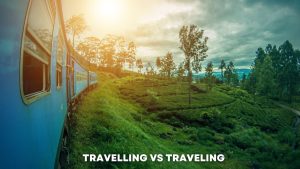Contents
- 1 Travelling vs traveling
- 1.1 Travelling vs traveling : Understanding the Difference
- 1.2 The Origins of “Travelling” and “Traveling”
- 1.3 Usage of “Travelling” vs. “Traveling”
- 1.4 Examples of “Travelling” vs. “Traveling” in Literature and Media
- 1.5 Common Usage in Digital Platforms
- 1.6 Travelling vs. Traveling: A Comparative Table
- 1.7 The Impact of Globalization on Language
- 1.8 Language Evolution: What Does the Future Hold?
- 1.9 Frequently Asked Questions (FAQ)
- 1.9.1 H4: Why do British and American English have different spellings?
- 1.9.2 H4: Is one spelling more correct than the other?
- 1.9.3 H4: Can I use both “Travelling vs traveling” in the same document?
- 1.9.4 H4: How does the choice between “Travelling vs traveling” affect SEO?
- 1.9.5 H4: Are there other examples of British vs. American English spelling differences?
- 1.9.6 H4: How can I set my word processor to use British or American English?
- 1.10 Conclusion: Embracing the Diversity of English
- 1.11 External Resources and Links
- 1.12 Cultural Significance of Spelling Variations
- 1.13 Academic and Educational Perspectives
- 1.14 The Role of Technology in Language Standardization
- 1.15 The Psychological Impact of Spelling Variations
- 1.16 The Importance of Language Awareness
- 1.17 Conclusion: Celebrating Linguistic Diversity
- 1.18 External Resources and Links
- 1.19
- 1.20 How far does the sound of a gun travel
Discover the difference between “Travelling vs traveling” and learn which spelling is right for your next adventure.
Travelling vs traveling

Travelling vs traveling : Understanding the Difference
Introduction of Travelling vs traveling
Travelling vs traveling : Regarding the discussion of “Going instead of Traveling,” what is significant is unnoticeable yet fundamental. Though the two words mean the very same thing, they are fundamental for a greater etymological division achieved by regional tendencies, especially in English and American English. The starting points of the articulations “Travelling vs traveling,” as well as their utilization in various English vernaculars and the social repercussions of each, are the subject of this article. You will have a better understanding of the English language’s rich diversity if you are aware of these distinctions. This thorough aide will give clearness on this regularly befuddling point, whether you are a writer, an understudy, or just interested.
The Origins of “Travelling” and “Traveling”
The Evolution of the English Language
The English language is a rich embroidery of words acquired from different dialects, molded by hundreds of years of social trade and verifiable occasions. To grasp the reason why “voyaging” and “voyaging” exist as two variations of similar word, we should glance back at the development of English.
- Center English Roots: “travel” gets from the Center English word “travelen,” which itself comes from the Old French “travailler,” significance to work or work. This origin hints at the strenuous nature of travel in the past, which is quite different from the leisurely travels that we frequently associate with the word. Impact of Latin: The Latin word “tripalium,” a three-marked instrument of torment, likewise impacted the improvement of “travel.” Over the long haul, the significance mellowed, yet the word’s underlying foundations in labor and difficulty stay apparent.
British vs. American English
The differences between British and American English are to blame for the divergence between “Travelling vs traveling .”
- British English: When adding a suffix like “-ing,” words that end in a vowel followed by “l” frequently double the “l.” Consequently, “travel” becomes “voyaging.” This keeps an overall principle in English spelling that keeps up with consistency with elocution. American English: American English, in any case, favors improvement. The extra “l” was dropped as a result of Noah Webster’s advocacy for a more phonetic and simplified spelling system, which led to the word “traveling.” Webster was the founder of the first American dictionary. This change was important for a more extensive development to recognize American English from its English partner.
Usage of “Travelling” vs. “Traveling”
Regional Preferences
Understanding the provincial inclinations for “voyaging” versus “voyaging” is fundamental for any individual who composes for a worldwide crowd. In the US: “Voyaging” is the acknowledged spelling, lining up with American English’s propensity toward improved on spelling. “traveling” is almost always used by Americans, whether in formal writing, the media, or everyday communication. “Travelling” is the preferred spelling in the United Kingdom, Canada, Australia, and New Zealand, as well as the Commonwealth countries. These regions’ educational systems and cultural practices are deeply rooted in this usage.
Impact on Professional Writing
For experts, especially journalists and editors, the decision among “Travelling vs traveling” can have critical ramifications.
- Crowd Thought: While composing for a worldwide crowd, taking into account the provincial inclinations of your readers is significant. Using “traveling” in a publication based in the UK might be interpreted as an Americanization, whereas using it in an American context might be interpreted as an affectation from Britain. Consistency is Essential: Regardless of the format you choose, it is essential to keep your text consistent throughout. Your writing may lack professionalism if you consistently use the terms “traveling” and “traveling” to confuse readers.
Examples of “Travelling” vs. “Traveling” in Literature and Media
Literary Examples
Investigating the utilization of “Travelling vs traveling” in writing offers understanding into the verifiable and social settings of each spelling.
- English Writing: Prestigious English writers like Charles Dickens and Jane Austen reliably utilized “Travelling vs traveling” in their works. This decision mirrors the more extensive shows of English during their time. American Writing: On the other hand, American writers, for example, Imprint Twain and Ernest Hemingway decided on “Travelling vs traveling,” lining up with the American English spelling changes that were getting momentum in the nineteenth and twentieth hundreds of years.
Media Representation
In current media, the differentiation among “Travelling vs traveling” stays clear, especially in news coverage and online substance.
- English Media: Significant English distributions like The Watchman and The Times stick to the “voyaging” spelling, guaranteeing consistency with English standards. American Media: interestingly, American outlets, for example, The New York Times and The Washington Post reliably use “voyaging,” mirroring the standard American use.
Common Usage in Digital Platforms
Social Media and Blogging
In the computerized age, the utilization of “voyaging” versus “voyaging” via web-based entertainment and sites gives a depiction of worldwide etymological patterns.
- Global Platforms: Both spellings are used on platforms like Twitter and Instagram, but “traveling” is more common because of the global influence of American English. However, in countries like the UK and Australia, regional hashtags and user preferences may sway toward “traveling.” Publishing content to a blog and Website design enhancement: For bloggers, particularly those focusing on a worldwide crowd, the decision among “voyaging” and “voyaging” can influence site improvement (Web optimization). Ensure that your target audience’s spelling is correct to increase engagement and visibility.
Professional Communication
Understanding the difference between “Travelling vs traveling” is essential in professional settings, particularly international businesses.
- Corporate Correspondences: In global partnerships, inward correspondences frequently need to take care of a different labor force. Understanding territorial spelling inclinations guarantees clearness and forestalls mistaken assumptions. Client Relations: Proper spelling can show cultural awareness and professionalism when communicating with clients from different regions, resulting in stronger relationships.
Travelling vs. Traveling: A Comparative Table
To provide a clear comparison of “travelling” vs. “traveling,” the following table outlines key differences and preferences:
| Aspect | “Travelling” (British English) | “Traveling” (American English) |
|---|---|---|
| Regional Usage | UK, Canada, Australia, New Zealand | United States |
| Spelling Rule | Double “l” when adding “-ing” | Single “l” when adding “-ing” |
| Cultural Associations | Traditional, formal | Modern, simplified |
| Common Usage in Literature | Charles Dickens, Jane Austen | Mark Twain, Ernest Hemingway |
| Media Usage | The Guardian, The Times | The New York Times, The Washington Post |
| SEO and Digital Marketing | Higher engagement in UK/Commonwealth | Higher engagement in the US |
| Professional Context | Preferred in UK-based companies | Preferred in US-based companies |
The Impact of Globalization on Language
The Spread of American English
American English has become increasingly dominant as a result of the rise of the internet and global media, influencing spelling practices worldwide. Cultural Exports: For non-native speakers, American films, television shows, and music frequently serve as their first exposure to English. Thus, American spellings like “voyaging” are turning out to be more recognizable universally, even in districts where “voyaging” was once standard. Innovation and Programming: Most programming defaults to American English, further building up the utilization of “voyaging” over “voyaging.” This is particularly obvious in tech-driven enterprises where American organizations lead the market.
Resistance and Preservation
There is a strong movement to preserve British spelling conventions, particularly in former British colonies and within the UK itself, despite the global influence of American English. Educational Systems: Education curricula in countries like India, Canada, and Australia still emphasize British English, ensuring that “traveling” will always be spelled correctly for future generations. Cultural Identity: For many, the use of the word “travel” is a sign of cultural heritage and identity—a subtle way to keep in touch with British customs.
Language Evolution: What Does the Future Hold?
Predicting Spelling Trends

As language keeps on developing, anticipating the fate of spelling shows like “voyaging” versus “voyaging” is an entrancing activity.
- Union or Dissimilarity?: Will worldwide correspondence lead to a combination of spelling principles, or will provincial contrasts persevere? The preservation of British English in education and culture suggests that both forms will coexist for the foreseeable future, despite the fact that American English may continue to gain ground. Mechanical Impact: As man-made consciousness and AI advance, the impact of spellcheckers and autocorrect highlights on spelling standards will probably increment. This could either support American English guidelines or lead to more prominent customization choices in light of client inclinations.
Frequently Asked Questions (FAQ)
H4: Why do British and American English have different spellings?
The distinctions in spelling among English and American English emerged due to authentic, social, and etymological elements. In the 19th century, figures like Noah Webster, who sought to simplify and standardize spelling, led a series of spelling reforms in American English. English, then again, held a significant number of its conventional spellings.



1 thought on “Travelling vs traveling”